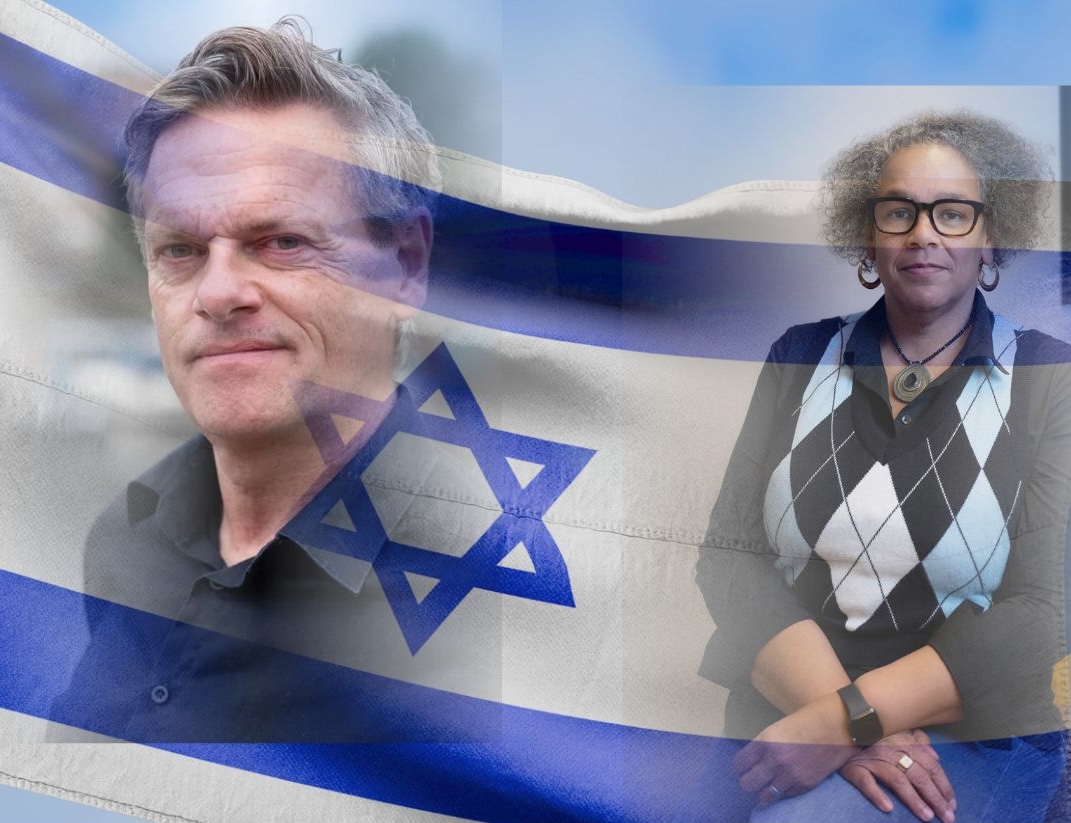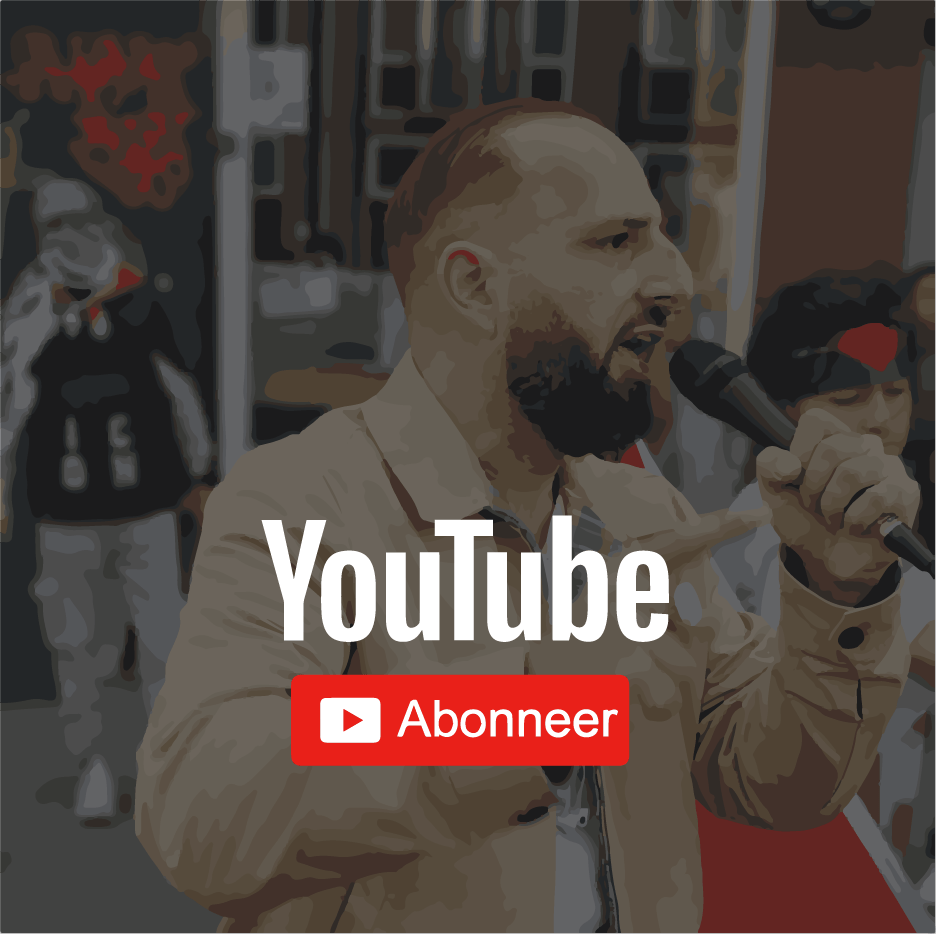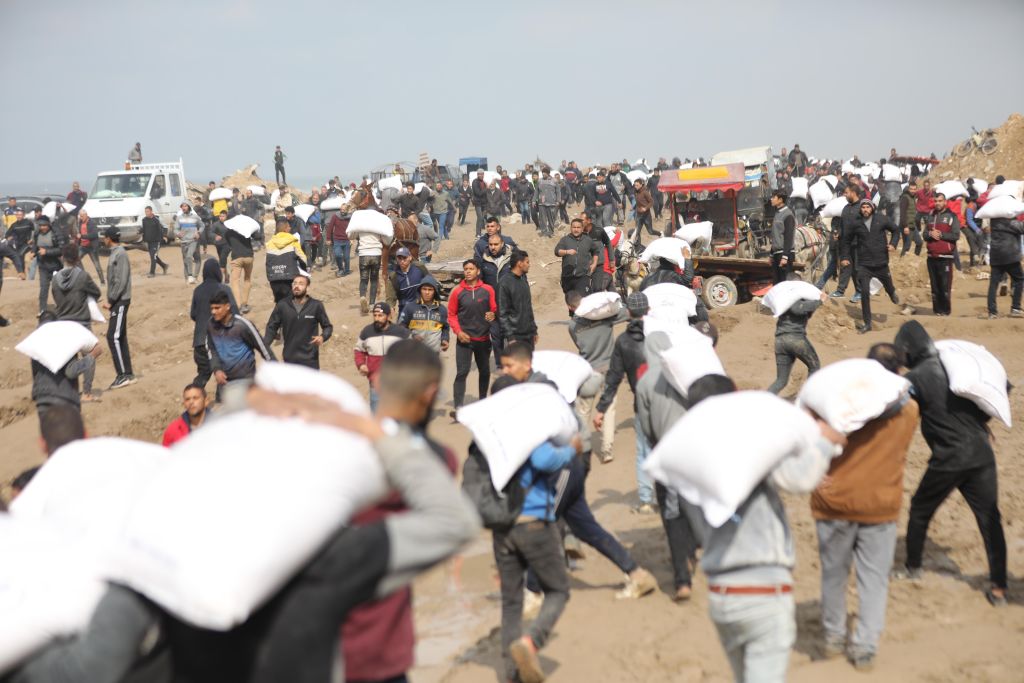Reading time: 12 minutes
Editor-in-chief Altan Erdogan (57) of the Amsterdam local broadcaster AT5 uses undercover officers at demonstrations, disguised as photographers. This revelation was made by photographer Daphne Channa Horn on her X-page. Amnesty Netherlands is also neglecting its watchdog function, by wrongly pointing to ‘violent demonstrators’ in favor of the police.
Daphne’s revelation is so convincing that Altan did not even deny it but had a personal conversation with her. Here he said that he would take action against this phenomenon but to make matters worse he failed to do so. Because even after this conversation, police informants were reported who posed as photographers. This goes against all journalistic codes. For example, the Charter of Ethics for Journalists of the International Federation of Journalists states that the journalist may not allow himself to be used as an extension of the authorities. Article 11 of this charter states:
“The journalist shall refrain from acting as an auxiliary of the police or other security services. He/she will only be required to provide information already published in a media outlet.”


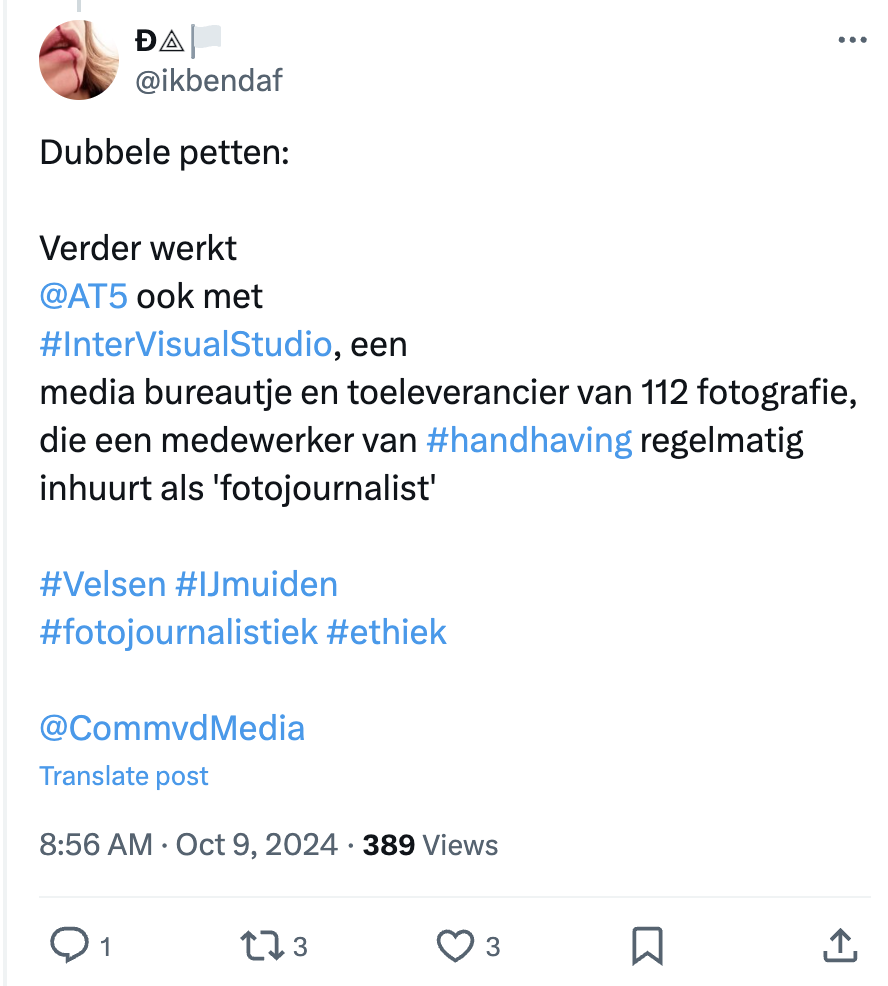
“A global charter for ethics for (photo)journalists (IFJ/NVJ) cannot be ignored. Neglecting multiple warnings, even one-on-one, is incomprehensible. This makes it more dangerous to work and I hold the editors-in-chief of AT5 co-responsible for this.”
Daphne Channa Horn responds in OliveX
Furthermore, according to Daphne, both the police and the mayor are aware of this incident. AT5 also works with a media agency, InterVisualStudio, which hires enforcement employees as ‘photojournalists’.
That AT5 has little interest in independent journalism has already been demonstrated when on 28 February of this year the first demonstration against mayor Femke Halsema took place at the Stopera. Demonstrators demanded that the municipality of Amsterdam should break all it’s ties with Tel Aviv. This was also drawn up in a petition; the mayor refused to accept the petition and AT5 completely ignored this topic. When activists disrupted the council meeting on the same day, AT5 also censored this journalistically worthy incident.
Unfortunately for AT5, they couldn’t completely ignore it, as an unlikely incident occurred. On May 7 of this year, the Binnengasthuis grounds of the UvA were occupied by anti-genocide activists. AT5 was also there and they decided, at a very unfortunate moment for them, to go live. And that happened when I gave a speech and lashed out at AT5.
WHO IS AT5 EDITOR-IN-CHIEF ALTAN ERDOGAN?
In the weeks and months after May, there were several more protests at the Stopera that grew in size. So big that AT5 could no longer ignore it. So they did report on it, but without mentioning the protesters’ demands, the most important of which was that Amsterdam had to end all forms of cooperation with Tel Aviv. The other demand was the demand for the mayor to condemn Israel for using hunger as a weapon. It is clear that AT5 is not at all an independent journalistic medium and that editor-in-chief Altan Erdogan is employed by Halsema as her PR man. It is therefore not surprising that AT5 has had poor viewership figures for years and has managed to survive solely because of the millions of euros subsidy from the municipality. Altan has not been able to turn the tide. He is known among journalists as a ‘civil servant’ because of his lack of creativity. In his current position at AT5, he is actually a de facto civil servant.
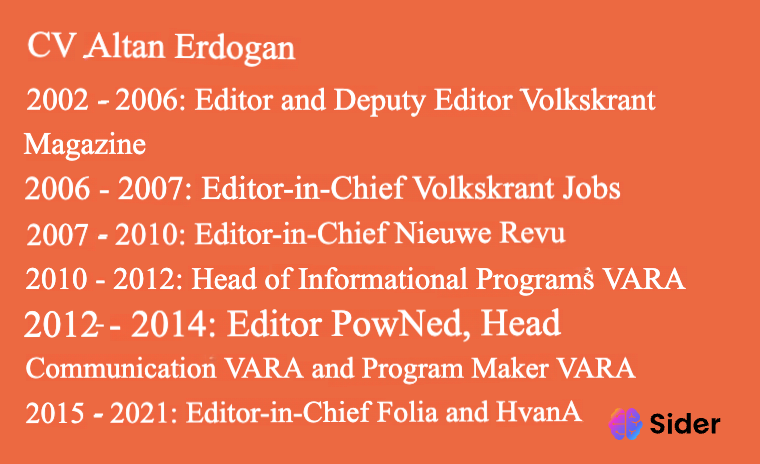
Looking at his resume, it is worth mentioning that he has hardly worked as an independent journalist. For example, he previously worked for the racist PowNed channel, and was editor-in-chief of Folia, the magazine of the University of Amsterdam. Both organizations have no room for independent journalism; Folia mainly reports on what is good for the UvA from the perspective of the board. Apart from that, Altan has also worked at magazine Nieuwe Revue, tv channel VARA, and Volkskrant Magazine. He has never been able to make a difference, in fact; he has failed in various projects. Under his leadership, the Nieuwe Revue was reorganized due to poor circulation figures. Altan decided to change the name to Revue, but this was quickly reversed by his successor. In the midst of a reorganization, Altan left again for what he called ‘a dream job’ because he received a nice offer from the VARA, as Head of Information Programs. However, this dream job also ended in failure and after two years he had to look for a new job yet again. He himself said about his departure: “The main reason is that the position ultimately did not suit me completely. Although it was a relatively short period, I had a wonderful time at the broadcaster”. The VARA itself also issued a short statement which one would presume that Altan was fired. The Turkish-Dutch man fell into a black hole, felt insecure as an unemployed man until he reluctantly started working at PowNed. This raised many eyebrows: a half-Turkish man who used to work for ‘left-wing’ media, is now going to work for a right-wing racist broadcaster? This was inexplicable. It was also embarrassing for Altan himself, so embarrassing that he deleted that part of his history of his LinkedIn profile.
Altan’s career since he was at the age of 40 is mainly characterised by short-time employments, with the exception of Folia and now AT5. Both of them are not really journalistic positions but fall more under the heading of communication/PR.
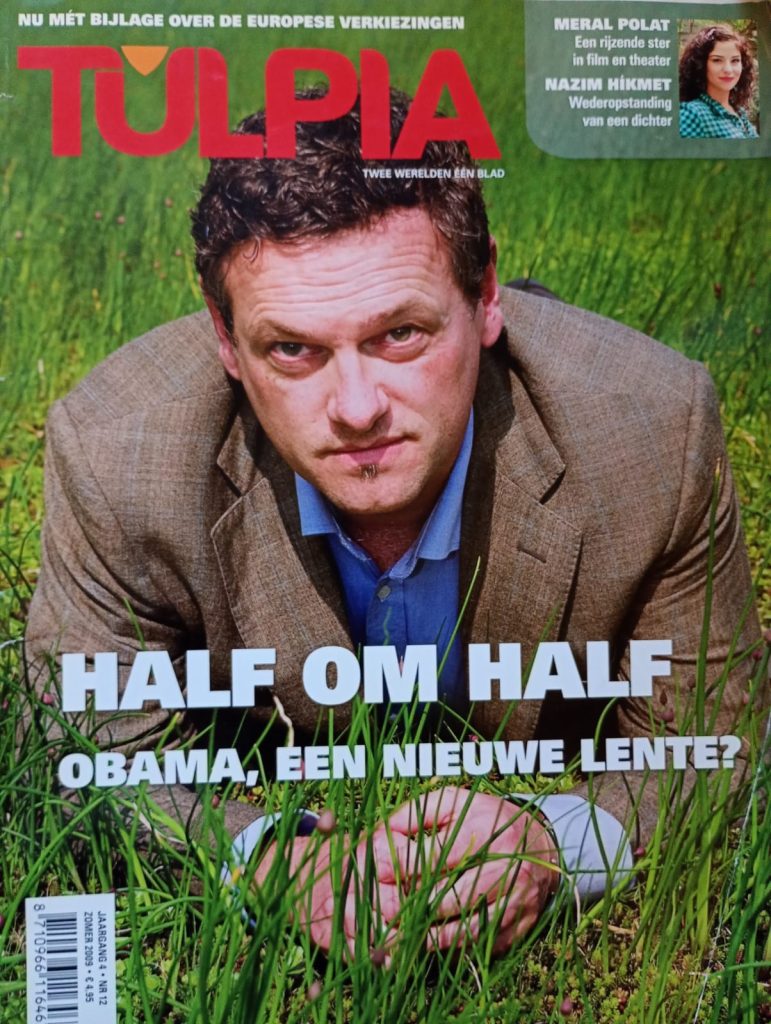
‘Altan Erdogan, together with his twin brother, chose Dutch nationality when he was 17 years old: “Otherwise you have to pay a ransom“.’
Before he reached the age of 40, the Amsterdam native had long tenures at the Parool and the Volkskrant. In an interview in 2009 for the Turkish-Dutch magazine Tulpia, Altan gives an insight into his life. For example, he says he has hardly ever applied for a job and that it has never been difficult for him to find a job: “Once you have made a name for yourself in our industry, everything goes well.”
This probably indicates that he focuses more on relationships than on his journalistic skills. How else could he have made a name? He is not known for certain revelations that he has made, the dream of every journalist.
In his career of over 30 years, Altan has not made a single noteworthy revelation. He himself believes that he owes his career to his perseverance: “I wanted to be better than others”.
At AT5 and Folia he is doing well, by their standards, even though the local channel still has poor viewing figures, while he did poorly at the more journalistic media: at Nieuwe Revue and the VARA. So badly that he himself cannot deny it. At the Volkskrant there is a good example to give, that he prefers relationships instead of journalism. When Barbara van Beukering was to become editor-in-chief of the VK magazine, there was fierce protest from the editorial staff because she did not have a journalistic background. They wrote a protest letter:
‘”We find the decision an unimaginable decision and contempt for the talent and journalistic craftsmanship present here. Without us being able to do anything about it, something is being imposed on us that is contrary to our idea of creating a high-quality magazine.” The entire editorial team had signed it, except Altan Erdogan, because he was to become my deputy.’
Barbara van Beukering
In conclusion, we can say that Altan mainly chooses for himself and that he has no proven successes as a journalist. The fact that he chooses to work as a PR man for an institute that has close ties with genocidal institutions, and thus also makes his indirect contribution to the genocide, shows his egocentrism. Altan is not only a failure as a journalist but also as a human being.
Text continues below
AMNESTY’S SOFT CRITICISM ON POLICE’S USE OF CAMERA SURVEILLANCE
Amnesty recently criticized the police for their use of camera surveillance. The so-called human rights organization states that there should be clearer rules about camera’s at demonstrations and calls for a ban on facial recognition technology, only if it is used to identify people. However, this research by Amnesty can best be qualified as only ‘soft criticism’ and ‘incomplete’. Incomplete because the report says nothing about the many undercover informants who pose as demonstrators or professional photographers and take photos of activists in that capacity. It is also incomplete because the police, as Daphne made clear, directly ask for images from photojournalists and threaten to confiscate them. This not only puts the right to demonstrate under pressure, but also press freedom. It can also be called soft criticism because Amnesty only says that the surveillance methods of the police are “not in accordance with human rights”. It does not specify which human rights are involved. The big question is whether the police’s methods are in accordance with the law, and Amnesty says nothing about that. So for this reason it can be called ‘soft criticism’.
The fear of a demonstrator is also shown by means of an underline quote on the website of Amnesty:
‘”An organizer of the demonstrations in question says: ‘I would like to work at a ministry. If I have a stamp behind my name somewhere, I might never get in there again, so I want to prevent that. That fear is deeply ingrained in everyone in this world.”‘
‘Anonymous activist’ (or a made-up quote)
This form of fearmongering is increased by the fact that Amnesty does not refute the concerns or say that such a label is unacceptable. That this fear is ‘really deeply ingrained in everyone‘ seems a bit exaggerated if it is an authentic quote. In this context, such a quote is nothing more than discouraging activists from demonstrating, and who would want to give such a message?
Another telling example is from May of this year; when the first student actions started. When the riot police violently ended the occupation of the Binnengasthuis, activists went to protest on the Rokin. This is referred to as ‘Wednesday evening’:
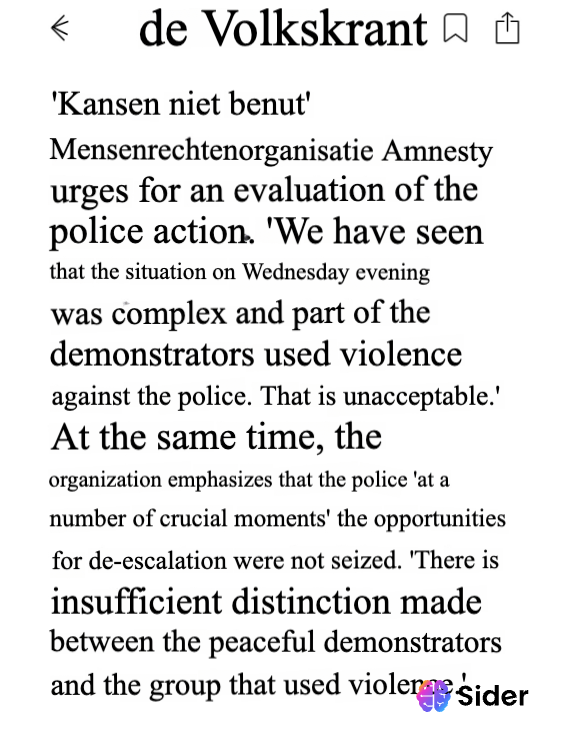
In this article, Amnesty calls it ‘unacceptable’ that demonstrators used violence against officers. They also say that the police did not take advantage of a number of opportunities for de-escalation. First of all, it is factually incorrect to say that demonstrators used violence against the police, as there are no images of it.
And again we only see soft criticism of the police, it is a narrative that the police would prefere. What is worse, is that Amnesty gave this statement without conducting an investigation.
‘Job-hopper’ Dagmar director Amnesty Netherlands
Then the question arises what Amnesty Netherlands drives to do such a bad work. The director of Amnesty is Dagmar Oudshoorn and to say the least she is a very strange person in this position. One of the reasons is that she has worked for the police: for the National Police, unit Amsterdam. So the report and the statement of Amnesty are about her former colleagues, and this alone gives the impression of a conflict of interests. She also has worked as mayor in Uithoorn and was a director in the Feijenoord district council. She is therefore a political administrator and this makes her unsuitable to work as a director of a human rights organization. As a human rights activist you are tasked witΩh checking precisely those administrators. The profile of a director should be someone who exposes abuses, someone who has a proven track record of revealing human rights violations, an independent investigator. Dagmar has no experience in this at all and has never been independent. On the other hand, she does have experience with shooting firearms.
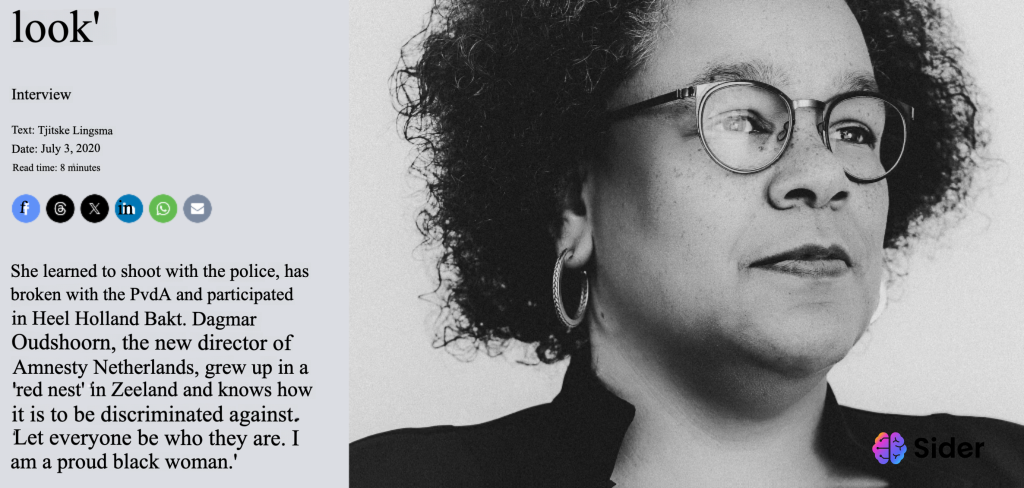
Officially, the board of Amnesty appoints the director and the board consists of 8 people. One of those people is Nenita la Rose who served a term as a member of the Amsterdam city council for the PvdA, Dagmar’s former party. The chairman of the board was Frank Heemskerk, also a PvdA member who was a member of parliament and State Secretary. It therefore seems very likely that her appointment came through the passing of jobs among politicians. In the interview in the image above, Dagmar says that she was approached to apply for a job at Amnesty, without giving any further details: ‘I am not a job-hopper, but of course this was Amnesty!’
Furthermore, Dagmar does not want to speak of a genocide in Gaza, she does not criticize mayor Femke Halsema or the policy for the fact that pro-Palestine activists are dealt with more state pressure than other activists. There is more police violence and prosecutors and judges demand and give heavier sentences for this group than other demonstrators. In the interview she gave for the Parool on November 19, she gives a fairly pro-Israeli picture. OliveX has analyzed this interview, see images below.
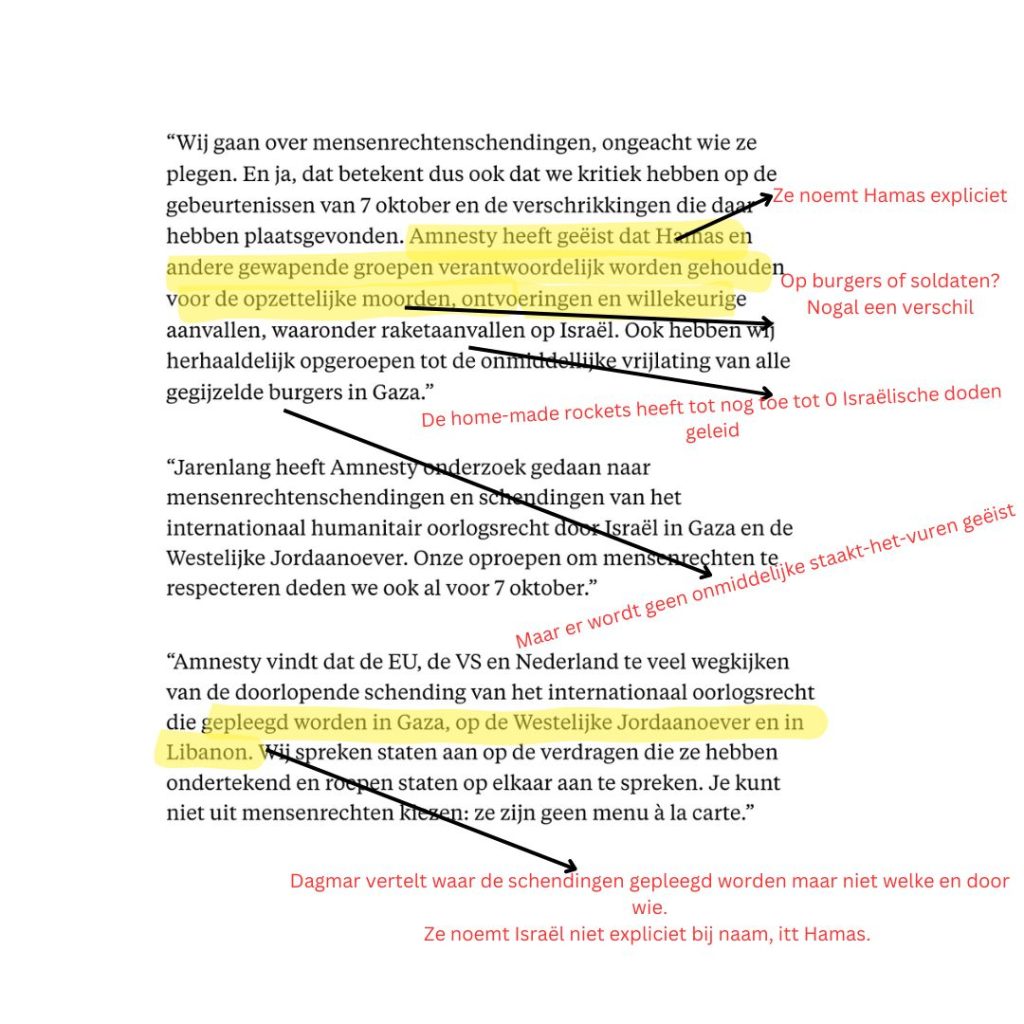

It is interesting to note that the uncharming Dagmar was the chair of the Advisory Board Dialogue Group Slavery-history, which was set up by the Interior Ministry and had the actual task of ensuring that the slavery apology would proceed smoothly without leading to protests within the black community. This advisory board was therefore anything but independent and was on the same page as the government. When the advisory report Route to Recovery was presented on 4 April, Dagmar was allowed to give the opening speech. Here she underlined and emphasised several times that reparations to individuals (i.e. compensation to the descendants of the slaves) was not a good idea. One of the arguments she gave was that the chance of receiving a sum of money was very small. The fact that the chance is small, if this were true, does not say anything about whether the descendants of the slaves should or should not demand it. These two things are unrelated.
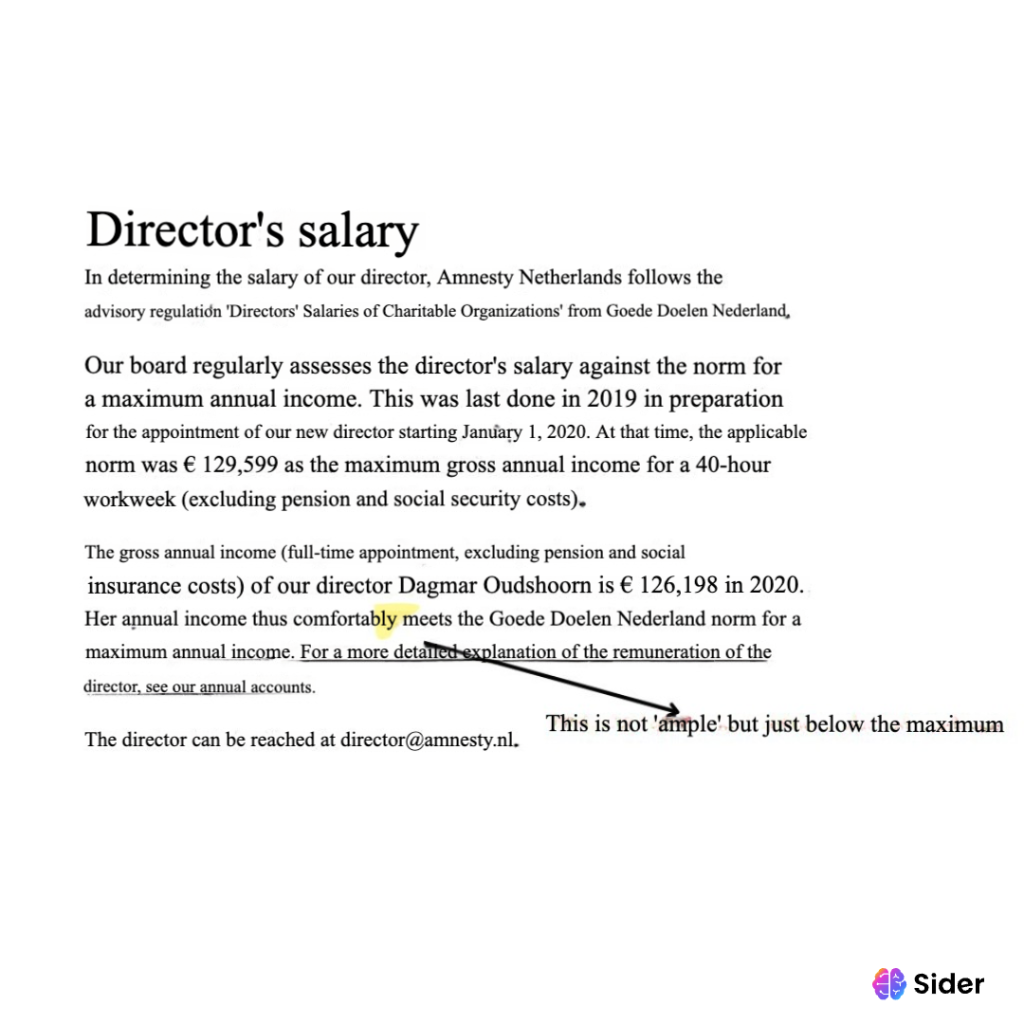
It is clear that Dagmar and Altan are puppets of the system. In exchange for their independence, they get prestigious jobs and a good income. They serve the white system at the expense of marginalised groups, #true.

